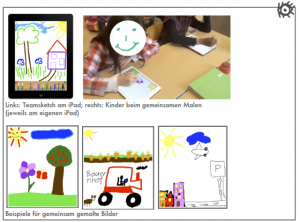 Spannend, am Wochenende hab ich meine persönliche Schrift mit der App iFontMaker erstellt und dann gleich unter Public Domain gestellt. Das ist jetzt eine interessante Entwicklung, denn damit verliert auch das Schriftbild die unweigerliche Zugehörigkeit zu einer Person und es wird wiederum ein Teil meiner Identitiät digitalisiert. Ich frage mich jetzt auch wie es wirkt, wenn andere meine Schrift verwenden? Es wird sich wohl komisch anfühlen.
Spannend, am Wochenende hab ich meine persönliche Schrift mit der App iFontMaker erstellt und dann gleich unter Public Domain gestellt. Das ist jetzt eine interessante Entwicklung, denn damit verliert auch das Schriftbild die unweigerliche Zugehörigkeit zu einer Person und es wird wiederum ein Teil meiner Identitiät digitalisiert. Ich frage mich jetzt auch wie es wirkt, wenn andere meine Schrift verwenden? Es wird sich wohl komisch anfühlen.
Wie auch immer, zu allererst braucht sich keiner mehr mal wundern, wenn ich meine Präsentationen quasi schreibe, das ist ab sofort einfach ein Font :-).
Und ich darf hier wiederum die persönliche Unterschrift in Frage stellen, das ist etwas das wir schleunigst auf die digitale umstellen sollten.
[presentation] Emerging Technologies – from Past to Future #TEL #SeamlessLearning
Last friday I gave a keynote at „Education in The Digital Age & Multicultural Society” conference about emerging technologies in education. Here are my slides:
Klicken Sie auf den unteren Button, um den Inhalt von www.slideshare.net zu laden.
[publication] On Using Learning Analytics to Track the Activity of Interactive MOOC Videos #lak16
As part of the Workshop on Smart Environments and Analytics in Video-Based Learning at this year LAK`16 conference our contribution about „On Using Learning Analytics to Track the Activity of Interactive MOOC Videos“ got published.
Abstract:
It is widely known that interaction, as well as communication, are very important parts of successful online courses. These features are
considered crucial because they help to improve students‘ attention in a very significant way. In this publication, the authors present an innovative application, which adds different forms of interactivity to learning videos within MOOCs such as multiple-choice questions or the possibility to communicate with the teacher. Furthermore, Learning Analytics using exploratory examination and visualizations have been applied to unveil learners‘ patterns and behaviors as well as investigate the effectiveness of the application. Based upon the quantitative and qualitative observations, our study determined common practices behind dropping out using videos indicator and suggested enhancements to increase the performance of the application as well as learners‘ attention.
Reference: Wachtler, J., Khalil, M., Taraghi, B. & Ebner, M. (2016). On Using Learning Analytics to Track the Activity of Interactive MOOC Videos. Paper presented at LAK 2016 Workshop on Smart Environments and Analytics in Video-Based Learning, Edinburgh, United Kingdom, 26/04/16 – 26/04/16, pp. 8-17
Vorwissenschaftliche Arbeiten in Kooperation mit Austria Forum zu vergeben #tugraz
Es freut uns, dass wir heuer in Kooperation mit dem Austria Forum vorwissenschaftliche Arbeiten vergeben können und bitte bei Interesse einfach unter dieser E-Mail-Adresse uns zu kontaktieren. Die besten Arbeiten werden auch ausgezeichnet und ins Austria Forum übernommen.

[PechaKucha] Booksprints in der Hochschullehre #gmw16
Im Rahmen der GMW 2016 in Innsbruck nehme ich heute mit unseren Beitrag „Booksprints in der Hochschullehre“ an einer Pecha-Kucha-Session mit anschließendem Knowledge Cafe teil. Hierzu gibt es eine Kurzpräsentation über 3 Minuten und danach an den Tischen dreimal eine 20-minütige offene Diskussion. Ich freu mich jetzt schon auf die vielen TeilnehmerInnen.
Hier einmal die Folien für die Pecha-Kucha-Präsentation:
Klicken Sie auf den unteren Button, um den Inhalt von www.slideshare.net zu laden.
Hier die Unterlagen die ich für den anschließenden Tisch vorbereitet habe:
Klicken Sie auf den unteren Button, um den Inhalt von www.slideshare.net zu laden.
[master, presentation] Begleitstudie eines Online-Kurses im Inverse-Blended-Learning-Format #imoox #gol14
Kathrin Käfmüller hat die Begleitstudie zu „Gratis Online Lernen“ durchgeführt und die wesentlichen Ergebnisse hatten wir davon bereits hier auf Researchgate veröffentlicht. Hier nun noch ihre erfolgreiche Präsentation bei der Masterarbeitsverteidigung:
Klicken Sie auf den unteren Button, um den Inhalt von www.slideshare.net zu laden.
[workshop] Erstellung und Einsatz von Lernvideos

Sandra und ich sind heute in Chur zu Gast zu einem Workshop rund um Lernvideos. Wir berichten über Möglichkeiten, unseren Erfahrungen und wie man möglichst einfach auch selbst tatsächlich kurze Videos erstellen kann. Damit das ganze auch tatsächlich dann ein Lernvideo wird haben wir eine Vorlage für Ideensammlung entwickelt die möglichst alle Aspekte abdeckt.
Hier noch die Präsentationsfolien:
Klicken Sie auf den unteren Button, um den Inhalt von www.slideshare.net zu laden.
[publication] Kollaboratives Zeichnen zur Kreativitätsunterstützung #making
Wir haben einen Beitrag für das Buch „Making-Aktivitäten mit Kindern und Jugendlichen. Handbuch zum kreativen digitalen Gestalten“ beigesteuert und dabei die von uns entwickelte App Teamsketch vorgestellt. Damit kann man kollaborativ Zeichnungen erstellen und in weiterer Folge die Kreativität bei der Erstellung fördern, da Kinder neue Strategien entwickeln müssen um zu einer finalen Zeichnung gemeinsam zu kommen.
Zeichnen an sich ist natürlich ein hoch kreativer Prozess, der durch die Gruppenarbeit eine gänzlich neue Perspektive bekommt. Gemeinsames kreatives Arbeiten ist sicher eine gute Schulung für zukünftige Tätigkeiten.
[Weitere Hinweise zum Ablauf findet man am Medienpädagogik Praxis Blog]
[Buchkapitel auf ResearchGate]
[Link zum Buch „Making-Aktiväten mit Kindern und Jugendlichen“ auf ResearchGate]
[Link zum Buch „Making-Aktiväten mit Kindern und Jugendlichen“ auf Amazon]
Referenz: Ebner, M., Spitzer, M., Aureli, S. (2016) Kollaboratives Zeichnen zur Kreativitätsunterstützung. In: Making-Aktivitäten mit Kindern und Jugendlichen. Handbuch zum kreativen digitalen Gestalten. Schön, S., Ebner, M., Narr, K. (Ed.) Book on Demand, Nordersted, S. 108-112
Lehr-/Lernräume an der TU Graz
Tim hat mir ein Blogstöckchen zugeworfen, etwas das ich noch aus den Anfängen des Web 2.0 gekannt und geschätzt habe. Schön, wenn man also alte Traditionen ab und zu wieder aufgreift. Es geht also darum, dass wir etws über Lehr- und Lernräume (also tatsächlich physikalische Räume) schreiben, unsere Erfahrungen teilen.
Ich kann dazu kurz berichten, dass wir 2013 das große Glück hatten, einen Raum zu bekommen, mit dem Auftrag: „Macht doch einmal etwas Innovatives, Anderes als wir es auf der Universität gewohnt sind.“ Nun, das war nicht einfach, zumal viele Ideen sofort am Tisch waren, wenig strukturiert und abgestimmt. Vielleicht weil ich auch im Herzen zu sehr Wissenschaftler bin, hab ich mir das Vorgehen dann doch anders vorgestellt – wir haben im Prinzip es dann so gemacht:
- Zu Beginn stand die Rechereche – was machen andere, wo gibt es bereits gute Ansätze?
- Danach machten wir Workshops mit 3 Gruppen – Stakeholder, Lehrenden und Studierenden
- Schlussendlich haben wir das zusammengetragen und dann den Raum eingerichtet
Über das Ergebnis habe ich seinerzeit bereits hier berichtet (im Anschluss an den Bericht gibt es auch Fotos) und wir haben gute Erfahrungen im Betrieb gemacht (unter anderem mit dem Projekt L3T 2.0).
Was hat sich für mich persönlich sehr bewährt:
- Die fahrbaren Stromschienen kann man sehr empfehlen, die sind im Dauereinsatz rund um die Uhr.
- Die umlaufenden Magnetleisten helfen sehr, wenn man Gruppenarbeiten mit Plakaten macht. Man kann zwischendurch etwas aufhängen, spontan präsentieren.
- Besonders toll sind auch die unterschiedlichen Sitzmöglichkeiten und die schnelle Möglichkeit die Tische umzubauen um damit in andere Settings zu wechseln.
- Die Farben führen automatisch zu einer generellen frohen Grundstimmung – ein Professor meinte, das sieht für ihn ja aus wie Kindergarten. Auf meine Frage hin, ob dies schlecht sei, verneinte er gleich 🙂
- Die gute technische Ausstattung (WLAN, Projektor, Aufnahmemöglichkeiten, … geht zunehmends in den Hintergrund und wird einfach genutzt.
Das ganze hat so gut geklappt, dass man uns einen zweiten Raum gegeben hat, mit doppelter Grundfläche (ca. 80m2). Das Ergebnis sieht man hier auf dem Foto und ja, auch dieser Raum wird zunehmends genutzt und erfreut sich großer Beliebtheit. Und ein interessantes Detail zum Schluss: Die Ausstattung hat im Wesentlichen nicht mehr gekostet, also die übliche Ausstattung unserer Seminarräume.

[master, presentation] Einsatz von Open Educational Resources mittels Flipped Classroom im Mathematikunterricht #tugraz
Helmut hat sich in seiner Masterarbeit mit einem sehr interessanten Thema beschäftigt, dem Einsatz von OER mittels dem didaktischen Ansatz flipped classroom. Hier die Folien der Verteidigung seiner Masterarbeit:
Klicken Sie auf den unteren Button, um den Inhalt von www.slideshare.net zu laden.


